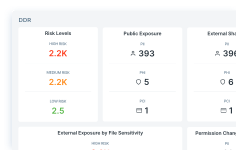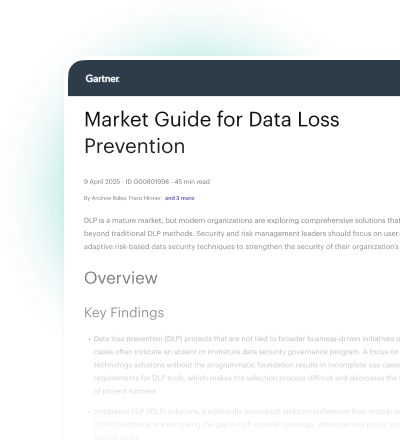What is SWG Security?
SWG Security refers to the protection provided by a Secure Web Gateway (SWG), a solution that defends an IT network from internet-related threats.

SWG Security Explained
Sitting between users and the internet, SWGs enhance security by inspecting web traffic to filter out unsafe content, block risky or unauthorized behavior, and monitor for potential data leaks.
As threats to IT environments become more sophisticated, SWG Security has become an integral part of the technology stack. Organizations often combine a Secure Web Gateway solution with technologies like a Cloud Access Security Broker (CASB), Secure SD-WAN, and Zero Trust Network Access (ZTNA) as part of a Secure Access Service Edge (SASE) architecture.
How SWG Security Works
Organizations can access SWG Security through a cloud-based service, a software solution, or a physical web security appliance. Residing at the network’s edge, SWGs monitor traffic flowing in and out, determining whether traffic should be allowed, blocked, or quarantined based on the organization’s security policies.
The components of a web security gateway include:
- Policy enforcement. Secure Web Gateways enforce policies concerning how users interact with the web. Policies may enforce quotas on web usage, permit or deny access to certain applications and regulate all inbound and outbound web traffic.
- Data loss prevention. By inspecting outgoing traffic, SWGs can prevent sensitive information from being maliciously or accidentally leaked.
- URL filtering. SWGs can block user access to URLs that are known to be malicious, that violate acceptable use policies, or that consume too much bandwidth, such as streaming services.
- Application control. To ensure that data used by applications remains private and secure, SWGs use granular web security policies to identify, block or limit the usage of web apps and widgets.
- Malware detection. SWGs block malware threats that threat intelligence engines have identified.
- Sandboxing. Some SWGs offer sandboxing capabilities to run a copy of a suspicious website in an emulated network environment to detect malware.
- Antivirus. Using real-time virus signatures, SWGs can block traffic containing viruses.
The Advantages of SWG Security
When deploying SWG Security, organizations can:
- Detect and prevent emerging threats. SWGs can identify malicious code, potential threats, and sensitive data inside web traffic. By constantly monitoring traffic against up-to-the-minute threat intelligence, SWGs can help to fend off a wide range of threats.
- Detect threats in encrypted traffic. A large amount of web traffic today is not analyzed for threats, compliance, or policy violations because it is encrypted in SSL traffic. SWG Security helps prevent cybercriminals from using encryption to disguise malware by providing SSL inspection capabilities.
- Increase visibility. IT environments constantly evolve, with new content, links, and assets deployed daily. The monitoring and logging functions of an SWG provide security teams with greater visibility into assets, risks, and potential threats.
- Enhance compliance. By providing granular control over security management, SWGs help IT teams enforce policies related to regulatory report requirements. SWGs can also help prove compliance and streamline audits.
- Block user access to certain sites. The application controls of SWGs enable administrators to block or limit access to malicious or inappropriate web applications that violate company policy.
SWG Security and SASE
Secure Access Service Edge, or SASE, is a framework for a network architecture that combines networking and security functions in a single cloud-based service. SWG Security is a core capability of the SASE framework. It provides critical protections as part of a multi-layered approach to managing security for remote workforces and highly distributed IT environments.
In a SASE environment, organizations deploy SWG Security with CASB, SD-WAN, and ZTNA solutions to create a multilayered strategy for blocking threats, preventing access to malicious sites, stopping users from downloading malicious content, controlling access to cloud applications and limiting access to network resources.
SWG Security with Forcepoint
Forcepoint offers secure web gateway security as part of the Forcepoint ONE SSE platform. Forcepoint ONE SWG monitors and controls user interactions with every website, blocking access to suspicious sites based on category and risk scores.
Forcepoint ONE SWG also detects shadow IT, blocks malware downloads and prevents uploads of sensitive data to personal file-sharing accounts. An optional feature is Remote Browser Isolation (RBI).
As a leader among secure web gateway vendors, Forcepoint offers distributed enforcement that delivers more flexibility. Organizations can enforce in a hyper-scale cloud with more than 300 PoPs or use endpoint enforcement that allows users to go straight to safe sites for faster performance.
Forcepoint SWG also offers the following:
- A unified administrator console to reduce repetitive and redundant configuration tasks.
- Data-in-motion scanning to block malware and data exfiltration between users and web applications, no matter where they’re located.
- Control over website access down to the URL directory level.
- SWG functions that cannot be bypassed or disabled by the user.
Related
The Painless Guide to Security Service Edge (SSE)
E-Book lesenGet Safe Access to ANY Website and Downloaded Documents with Zero Trust Web Access
Infografik anzeigen








